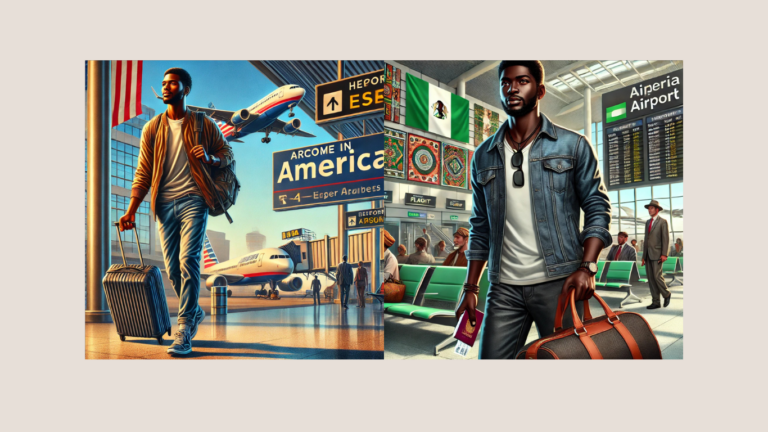How to Travel from Nigeria to America: A Complete Guide
Traveling from Nigeria to America is a dream for many, whether it’s for tourism, education, business, or a family visit. The journey may seem overwhelming at first, but with the right information and preparation, you can make the process smoother and more efficient. From visa requirements to flight booking and arrival tips, this guide will walk you through everything you need to know about traveling from Nigeria to the United States.
1. Visa Requirements: Your First Step
Before you even think about booking a flight, the first thing you need to consider is whether you need a visa to enter the United States. Nigerian citizens are required to obtain a visa for nearly all types of travel to the U.S. Some common visa types include:
- B1/B2 Visa: For tourism, business, or visiting family.
- F1 Visa: For students planning to study in the U.S.
- H1B Visa: For work-related travel, particularly for skilled professionals.
- J1 Visa: For exchange programs such as internships, research, or cultural exchanges.
The application process for a U.S. visa involves several steps, including filling out the DS-160 form, paying the application fee, scheduling an interview at the U.S. Embassy or Consulate, and attending a visa interview. It is essential to apply well in advance, as visa processing can take several weeks.
2. Booking Your Flight from Nigeria to America
Once your visa is secured, the next step is booking your flight. There are several major international airports in Nigeria, including *Murtala Muhammed International Airport (Lagos), **Nnamdi Azikiwe International Airport (Abuja), and *Port Harcourt International Airport, all of which offer flights to various destinations in the United States.
Here are some important considerations when booking your flight:
- *Direct vs. Connecting Flights: While direct flights from Nigeria to the U.S. are available, most travelers will need to book connecting flights, especially if they are traveling to cities other than New York, Atlanta, or Washington, D.C. Airlines such as **Delta, **United Airlines, **Ethiopian Airlines, and *British Airways provide routes that connect through hubs in Europe, the Middle East, or other African cities.
- Flight Duration: A direct flight from Lagos or Abuja to major U.S. cities like New York or Atlanta typically takes between 10 to 12 hours. Flights with layovers can take considerably longer depending on the number of stops.
- *Flight Booking Tips: To get the best deal on your flight, book your tickets at least 3 to 4 months in advance. Try to be flexible with your travel dates, as this can help you save money. Also, consider using price comparison tools like *Google Flights or Skyscanner to find the most affordable options.
3. Prepare for Your Trip: Packing Essentials
Packing for a long flight from Nigeria to the U.S. requires careful thought. Here are some tips to ensure you’re well-prepared for your journey:
- Travel Documents: Keep your passport, U.S. visa, flight tickets, and any other essential documents in an easily accessible folder. You may be asked for these upon check-in, during security checks, or at U.S. immigration upon arrival.
- Clothing: The weather in the U.S. varies greatly depending on the region and time of year. Pack clothes that are appropriate for the climate of the U.S. city you’re visiting. For example, if you’re traveling during winter, pack warm clothing, especially if you’re headed to cities like New York or Chicago.
- Health and Medications: If you take regular medication, make sure to bring enough for the duration of your trip. It’s also a good idea to carry a doctor’s note or prescription, especially if you’re carrying controlled substances. Ensure you have health insurance or travel insurance in case of any emergency.
- Currency and Credit Cards: The U.S. uses the U.S. Dollar (USD), so consider exchanging some Nigerian Naira (NGN) into dollars before departure. Credit and debit cards are widely accepted in the U.S., so bringing an internationally accepted card like Visa or Mastercard is a good idea.
4. U.S. Immigration and Customs: What to Expect
Once you arrive in the U.S., you will go through immigration and customs. Here’s what to expect during this process:
- *Immigration Check: You will need to present your passport, visa, and any required documents to U.S. *Customs and Border Protection (CBP) officers. They may ask you questions about the purpose of your visit and your plans in the U.S. Be prepared to answer clearly and confidently.
- Customs Declarations: You’ll need to fill out a customs declaration form. This is where you declare any items you are bringing into the U.S., including gifts, food, or items above a certain value. Be honest and accurate when filling out this form to avoid any issues.
- Biometric Data: U.S. immigration authorities may take your fingerprints and a photograph as part of the entry process. This is standard for most international travelers.
5. Transportation Options in the U.S.
Once you’ve cleared immigration and customs, you’ll need to figure out how to get to your destination. Here are a few transportation options:
- *Airport Transfers: Most major airports in the U.S. have shuttle buses, taxis, or ride-sharing services like *Uber and Lyft that can take you directly to your hotel or accommodation.
- *Public Transportation: Public transport in major U.S. cities like **New York, **Chicago, and *San Francisco is well-developed, with subway, bus, and rail systems. However, in smaller cities or towns, you may need to rely more on taxis or rental cars.
- Rental Cars: If you’re traveling outside of major cities, renting a car might be your best option for getting around. Be sure to bring an international driver’s permit (IDP) along with your Nigerian driver’s license if you plan to drive in the U.S.
6. Cultural Etiquette and Tips for Traveling in the U.S.
The U.S. is a diverse country with various cultures, so it’s important to be aware of some basic cultural norms:
- Tipping: Tipping is a common practice in the U.S., especially in restaurants, taxis, and hotels. The standard tip is around 15-20% of your bill in restaurants.
- Time Zones: The U.S. spans multiple time zones, so make sure to check the local time of your destination.
- *Emergency Number: The emergency number in the U.S. is *911. This number can be dialed for police, fire, or medical emergencies.
7. Safety and Health Considerations
Traveling to the U.S. can be a safe and enjoyable experience, but it’s always good to take precautions:
- *Health Insurance: Ensure that you have travel or health insurance for the duration of your stay in the U.S. Healthcare in the U.S. can be expensive without insurance. Consider purchasing insurance from reputable providers like *World Nomads or Allianz Travel.
- Local Laws: Familiarize yourself with U.S. laws, especially regarding things like alcohol consumption, smoking, and driving. Different states may have different regulations.
Final Thoughts
Traveling from Nigeria to the U.S. is an exciting experience, but it requires careful planning. From visa applications to booking your flight and navigating customs, following these steps will help you ensure a smooth and stress-free journey. By staying informed and organized, you can enjoy everything America has to offer, whether you’re visiting for leisure, business, or education. Safe travels and enjoy your adventure!
To know more about how to turn your adventure in to a fulltime job click here https://hustleandtour.com/from-tourist-to-resident-how-to-turn-your-travel-adventures-into-a-full-time-life-abroad/


1 Comment
Pingback: Detty December: The Complete Guide to Nigerian and Ghanaian Celebrations - Hustle and Tour